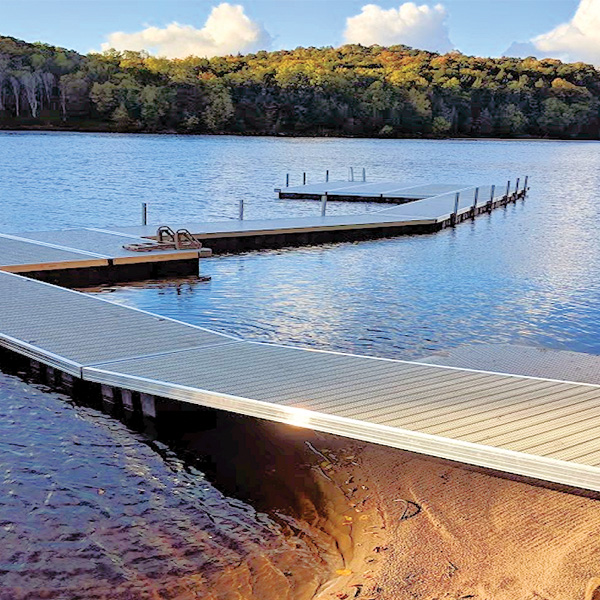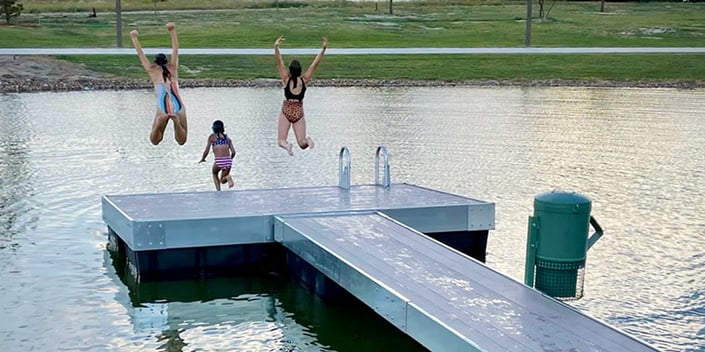Your Overview to Finding the most effective Dock Company for Quality and Dependability
Your Overview to Finding the most effective Dock Company for Quality and Dependability
Blog Article
Create the Perfect Docking Service With Floating Docks
Floating docks existing a versatile option for a variety of maritime requirements, adjusting seamlessly to changing water degrees and diverse vessel kinds. Their modular nature permits for quick installment and moving, yet the selection of appropriate products and layout features is essential for ensuring both capability and visual allure. As we check out the essential components that add to the effectiveness of floating docks, numerous essential variables regarding security and maintenance will emerge, raising inquiries regarding just how to maximize your docking experience. The succeeding discussion will certainly illuminate these crucial considerations.

Advantages of Floating Docks
Floating docks offer many advantages that make them a suitable choice for numerous maritime applications. Unlike fixed docks, floating docks increase and autumn with the tide, guaranteeing consistent access for vessels.
Furthermore, floating docks are usually much easier and quicker to install contrasted to typical set structures. Their modular style allows for simple assembly and disassembly, assisting in upkeep and relocation when required. This versatility is especially valuable for short-term applications or in settings where conditions may change.
Floating docks likewise tend to be much more eco-friendly, as they reduce disruption to the seabed and surrounding marine environments. Their resilient nature lowers the danger of damages to marine life, advertising a healthier setting. Moreover, these docks can be tailored to accommodate numerous vessel sizes, ensuring that they meet particular functional requirements - dock company.
Eventually, the combination of adaptability, simplicity of installment, and environmental considerations makes floating docks a highly efficient service for a wide variety of maritime needs.
Choosing the Right Materials
Picking the appropriate materials for floating docks is vital to guarantee longevity, stability, and longevity. The choice of materials directly impacts the dock's efficiency in numerous ecological problems, consisting of direct exposure to water, sunlight, and prospective wear from marine website traffic.
Typical materials used for floating docks consist of aluminum, wood, and high-density polyethylene (HDPE) Light weight aluminum is lightweight, corrosion-resistant, and calls for minimal maintenance, making it an excellent option for long life. Its first expense can be greater contrasted to various other products.
Timber, while visually attractive and offering a conventional look, can be prone to rot and bug damage if not correctly treated. Using pressure-treated wood or normally long lasting types like cedar or redwood can reduce these problems.
HDPE is a popular selection because of its resistance to UV rays and chemicals, along with being environmentally pleasant. floating dock company. It is lightweight and offered in different colors, permitting personalization
Ultimately, the right product choice will depend upon particular requirements, including budget plan, preferred looks, and ecological factors to consider. Careful analysis of these variables will result in a effective and durable floating dock option.
Style Considerations for Stability
When creating floating docks, making sure security is a basic aspect that can considerably influence their functionality and safety and security. Security in floating dock design is affected by different elements, including buoyancy, weight circulation, and the plan of elements.
Weight circulation is essential; uniformly distributing lots across the dock prevents turning and enhances security. Wider designs can offer enhanced stability, specifically in rough water conditions, useful link while longer docks might call for extra supports to prevent sagging.
An additional vital factor to consider is the ecological impact, consisting of wave activity and wind. Integrating functions such as sidewalls or skirting can aid mitigate the impacts of environmental pressures, maintaining stability in damaging conditions. Eventually, a mix of thoughtful style, material selection, and understanding of environmental aspects will yield a drifting dock that meets both security and safety requirements.
Installment Tips and Techniques

Next, protect the essential authorizations and comply with neighborhood policies, which may dictate installment techniques and environmental considerations. Engage a certified contractor experienced in floating dock setups if required. Use high-grade products made for aquatic atmospheres to enhance resilience and longevity.
When positioning the dock, straighten it identical to the shoreline to facilitate easy access. Ensure that the anchoring system is durable, utilizing concrete blocks or helical anchors to maintain the dock versus wind and wave action. It's important to represent seasonal water degree changes, consisting of prospective ice activity in chillier climates.
Throughout the installation, ascertain the dock's floatation and stability prior to settling the anchoring. On a regular basis evaluate the installment for any indicators of wear or damages. By adhering to these ideas and techniques, you can accomplish a safe and secure, useful, and visually pleasing floating dock installation that satisfies your needs.
Upkeep and Treatment Guidelines
Preserving and caring for floating docks is essential to lengthening their lifespan and making sure secure use. Regular inspections must be carried out to identify any indications of wear, damages, or marine development. Search for splits, loosened fittings, or blemished areas on the dock's surface area, as these concerns can jeopardize structural stability.
Cleaning up is necessary. Utilize a stress washing machine to remove algae, barnacles, and debris, which can gather over time. For stubborn development, think about eco-friendly cleaner that will not damage aquatic life.
Additionally, check the mooring lines and visit here anchors frequently to ensure they are safe and complimentary from corrosion. Replace any frayed or harmed lines without delay to maintain stability.
Throughout severe weather condition, such as storms or freezing conditions, take precautionary measures. Safeguard the dock with extra mooring lines and, if practical, get rid of any detachable parts to avoid damage.
Verdict
In verdict, the application of floating docks presents a functional and effective docking remedy appropriate for various maritime applications. Their adaptability to rising and fall water degrees, integrated with a modular design, permits for simple customization and relocation. Selecting ideal materials improves both durability and visual charm, while careful factor to consider of stability ensures security and longevity. With appropriate installment and regular maintenance, floating docks can supply trusted and efficient docking experiences for a vast array of vessels.
As we discover the important aspects that add to the effectiveness of floating docks, several key elements pertaining to stability and upkeep will certainly arise, raising questions concerning how to optimize your docking experience. Unlike taken care of docks, floating docks increase and loss with the tide, ensuring consistent ease of access for vessels.When developing floating docks, making certain stability is a basic facet that can dramatically influence their capability and find here security. Security in floating dock design is affected by various factors, including buoyancy, weight distribution, and the setup of elements. Eventually, a mix of thoughtful style, material selection, and understanding of ecological aspects will produce a floating dock that fulfills both security and safety and security needs.
Report this page